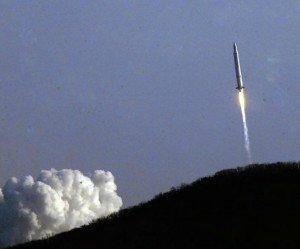South Korea: First rocket launch successful

HOUSTON, WE HAVE NO PROBLEM A rocket takes off from a launch pad at the Naro Space Center in Goheung, South Korea, on Wednesday. South Korea said it had successfully launched a satellite into orbit from its own soil for the first time. After failing in 2009 and 2010, the launch is a culmination of efforts by South Korea to advance its space program and cement its standing as a technology powerhouse. AP
SEOUL—South Korea on Wednesday said it successfully launched a satellite into space from its own soil for the first time, a point of national pride that came weeks after archrival North Korea accomplished a similar feat to the surprise of the world.
The South Korean rocket blasted off from a launch pad in the southwestern coastal village of Goheung. Science officials told cheering spectators minutes later that the rocket delivered an observational satellite into orbit. There was no immediate confirmation that the satellite was operating as intended.
A positive outcome after successive failures in 2009 and 2010 was critical to ensuring the future of South Korea’s launch program and realizing its ambition of membership of an elite global space club.
The launch is a culmination of years of efforts by South Korea—Asia’s fourth-largest economy—to advance its space program and cement its standing as a technology powerhouse whose semiconductors, smartphones and automobiles command global demand. North Korea’s long-range rocket program, in contrast, has generated international fears that it is getting closer to developing nuclear missiles capable of striking the United States.
South Korea’s success comes amid increased tension on the Korean Peninsula over North Korea’s threat to explode its third nuclear device. Pyongyang is angry over tough new international sanctions over its Dec. 12 rocket launch and has accused its rivals of applying double standards toward the two Koreas’ space programs.
A cover for banned missile
Washington and Seoul have called North Korea’s rocket launch a cover for a test of Pyongyang’s banned ballistic missile technology.
Both Koreas see the development of space programs as crucial hallmarks of their scientific prowess and national pride, and both had high-profile failures before success. South Korea tried and failed to launch satellites in 2009 and 2010, and more recent launch attempts were aborted at the last minute.
The satellite launched by Seoul is designed to analyze weather data, measure radiation in space, gauges distances on earth and test how effectively South Korean-made devices installed on the satellite operate in space. South Korean officials said it will help them develop more sophisticated satellites in the future.
US experts have described the North’s satellite as tumbling in space and said it does not appear to be functioning, though Pyongyang has said it is working.
The South Korean rocket launched on Wednesday had its first stage designed and built by Russian experts under a contract between the two governments.
North Korea built its rocket almost entirely on its own, South Korean military experts said earlier this month after analyzing debris retrieved from the Yellow Sea last December.
In designated orbit
The 140-ton Korea Space Launch Vehicle (KSLV-I) blasted off at 4 p.m. (0700 GMT) from the Naro Space Center on the south coast, reaching its target altitude nine minutes later and deploying its payload satellite.
Scientists and officials gathered at the space center cheered, applauded and hugged each other as the satellite was released.
“After analyzing various data, the Naro rocket successfully put the science satellite into designated orbit,” Science Minister Lee Ju-Ho told reporters at the space center.
“This is the success of all our people,” Lee said.
South Korea was a late entrant into the high-cost world of space technology and exploration and repeated failures had raised questions over the viability of the launch program.
“This success has put the country’s entire rocketry program back on track,” said independent space analyst Morris Jones.
Catching up
“They were under enormous pressure, given the earlier failures and the North’s success last month, and this will give them confidence and, of course, secure critical political and financial support for the future,” Jones said.
But South and North Korea still face a long slog to catch up with the other Asian powers with a proven track record of multiple launches—China, Japan and India.
Initially scheduled for Oct. 26, Wednesday’s launch had been twice postponed for technical reasons.
The delay meant that rival North Korea beat the South by launching a satellite into orbit on Dec. 12.
The North’s launch was condemned by the international community as a disguised ballistic missile test, resulting in UN sanctions that in turn triggered a threat by Pyongyang to carry out a nuclear test.
Wednesday’s mission was the last under the South’s current agreement with Russia, which agreed to provide the first stage for a maximum of three rockets.
US restriction
Seoul’s space ambitions were restricted for many years by its main military ally, the United States, which feared that a robust missile or rocket program would accelerate a regional arms race, especially with North Korea.
After joining the Missile Technology Control Regime in 2001, South Korea made Russia its go-to space partner, but the relationship has not been an easy one.
In 2009, the rocket achieved orbit but faulty release mechanisms on the second stage prevented proper deployment of the satellite.
The second effort in 2010 saw the rocket explode two minutes into its flight, with both Russia and South Korea pointing the finger of blame at each other.
South Korea has committed itself to developing a totally indigenous three-stage, liquid-fueled rocket capable of carrying a 1.5-ton payload into orbit by 2021. Reports from AP and AFP














